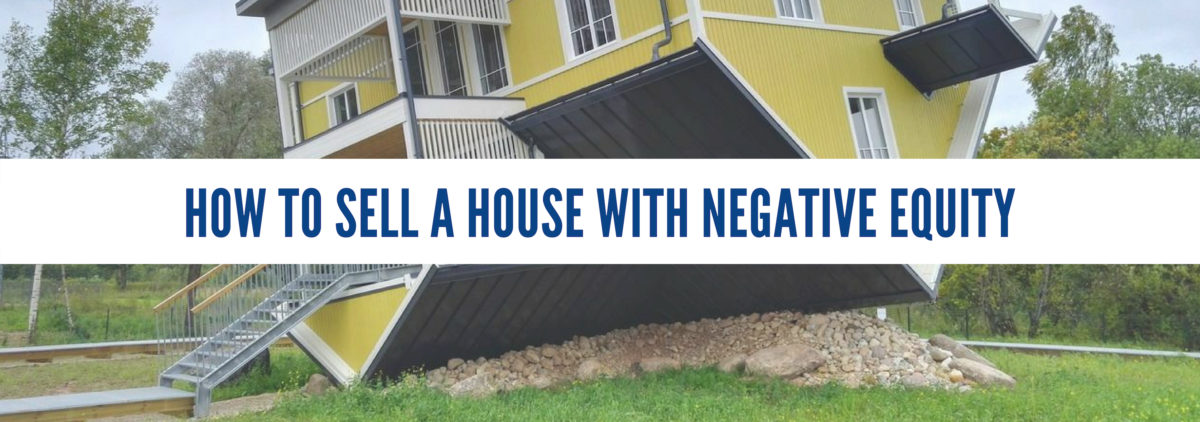Thousands of Americans currently have negative equity in their home. In fact, there were more than two million homes in negative equity in 2018 alone. These homeowners face the threat of delinquency, and worse, foreclosure as their property value remains stagnant or sinks even further. As this threat looms over stressed-out homeowners, is selling the property a possible solution? Continue reading below as we explore your options, including how to sell a house with negative equity!
What is a House with Negative Equity?

Quite simply, a house with negative equity is a property you owe more on the loan than the property itself worth. For example, if you purchased a home for $180,000 and it’s now only worth $140,000, you are $40,000 in negative equity. This is also known as being “underwater” or “upside down” in a house.
What Options Do I Have with Negative Equity?
If your house currently has negative equity, there are a few different paths you can take:
- Wait It Out
Despite having negative equity, you can choose to play the long game and stay in the home. As you continue to pay your mortgage, you can wait for the value of your home to potentially increase. There’s no guarantee your home will be worth what it once was, but it’s a viable option if you’re not facing foreclosure or repossession and can afford to continue pay the mortgage.
While staying in the home is a popular choice for most, it’s simply not possible for all. Life circumstances, such as illness, a divorce or needing to relocate for work, may force a homeowner’s hand. In such cases, you may need to sell your house fast.
- Rent Out the Property
If you want to keep the home but you absolutely need to move, another way to combat negative equity is to rent out the property. By renting the home, you can offset some of the costs by applying part or all of the rental payments to the mortgage. While renting the house, you can live somewhere with a cheaper monthly rate to further reduce your costs while also paying down your mortgage.
While renting at the home may seem like a great option, landlording is not for everyone. No matter how much research you do or precautions you take, there’s no way to truly tell what kind of tenants you will be allowing to stay in your home. And what’s more, as the homeowner, you are on the hook for any repairs that need to be made while the home is being rented out, which could leave you in an even worse situation financially.
 Loan Modification
Loan Modification
Loan modification is another option for homeowners with negative equity. With loan modification, a lender looks at your situation and presents different options based on the level of hardship you’re experiencing. A lender may agree to reduce your loan balance, lower your mortgage rate, lower your payments, or a combination of two or all three.
You will need to speak to your lender and apply for a loan modification. At which point, you’ll be asked about your hardship and prove why your current payments are too high. While lenders are willing to work with you, there is no guarantee they will modify your loan at the end of the process.
- Strategic Default
Strategic default is a controversial way some choose to deal with negative equity. With strategic default, a homeowner simply stops making monthly payments on the property whether they can afford them or not. The strategy is employed after the owner has decided the home will never increase in value and simply walks away.
While there’s an argument to be made there’s no reason a homeowner should continue sinking money into a bad investment, there are still consequences that come along with the decision. The property will go into foreclosure and a negative judgement will stick on your credit report for the ensuing seven years.
- Short Sale
A short sale is another option for those looking to get out of their negative equity home. With this option, homeowners can recoup some or close to all of their investment.
In a short sale, any offer you receive must be approved by your lending company. Your lender also reserves the right to refuse or reject any offer, and some won’t even consider a short sale whatsoever.
If you are able to complete a short sale, it’s important to note that your credit score will take a hit, but it is typically less serious than a foreclosure. A short sale may lead to a 75-200-point loss, while a foreclosure could cost you anywhere from 200-300 points.
A short sale will also remain on your credit report for seven years, but you are typically able to finance a new home in as soon as a year. In a foreclosure situation, you will likely need to wait at least three years and as many as seven.

Highest Cash Offer Can Buy Your House with Negative Equity!
If you have a house with negative equity, Highest Cash Offer can give you the CASH you need! Our professionals have decades of experience in short sales and buying homes with negative equity. And with Highest Cash Offer, there are:
- NO REPAIRS
- NO CLOSING COSTS
- NO REAL ESTATE AGENTS TO HIRE
- NO LISTINGS TO POST
And what’s more, you can get CASH for your negative-equity home in as little as ONE WEEK!
To get a FREE, NO-OBLIGATION offer on your home NOW, call (888) 387-5750 or submit your information right here!



 Highest Cash Offer is a real estate solutions company. Our team of experts specialize in assisting homeowners with a wide variety of solutions to any real estate problem. Whether we buy your house for cash or not, our goal is to help you get the desired outcome you deserve.
Highest Cash Offer is a real estate solutions company. Our team of experts specialize in assisting homeowners with a wide variety of solutions to any real estate problem. Whether we buy your house for cash or not, our goal is to help you get the desired outcome you deserve.